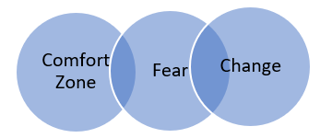Fear and Comfort Zones: Are You Scared of Change?
By Serlina James, LCSW, LISW-CP
I believe it is safe to say that change is inevitable, as we are changing on a daily basis. In essence… minute-by-minute, considering the evolution of life guarantees that we will all encounter change and go through changes on the most basic level of existence, as there is no escaping the aging process. Aging is “unconscious change,” a natural process, and an expected course of life. In my experience, I have noticed that people are more uncomfortable with being conscious of change when a reward is not attached.
Why do we fear change?
The process of change takes people out of their comfort zones and that’s what most people fear. We’re more comfortable with the idea of change than the process of change. In the case of a planned change, we attach positive meaning to the experience and look forward to the expected event whether it’s starting a new job, going on vacation, or setting New Year’s resolutions. With this perspective, change can be just as gratifying as it is scary. When we assign a positive value to the “change experience,” the process of change is satisfying and the idea of change is not feared; it is exciting and welcomed. People fear change based on the thoughts, beliefs, and ratings which they have assigned to the fear that is in between the comfort zone and change.
The process of change
It’s important to understand that there is a natural and healthy level of fear. Fear is not a bad thing but the way that one responds to fear can be unhealthy. We all have fears and we all have a comfort zone that is easy to get stuck in day-to-day. Leaving this zone can be anxiety-producing due to the uncertainty of what lies ahead and the possibility of an undesirable outcome. However, change is not something that we can avoid and fear is not something that we skip over — we have to go through fear to get to change.
Change is not something that we can avoid and fear is not something that we skip over — we have to go through fear to get to change.

As we courageously leave the comforts of familiarity, we grow. Neale Donald Walsch’s quote “Life begins at the end of your comfort zone” suggests that we only begin to truly experience life when we move outside of our comfort zone. I often think that we grow through our fears. New experiences help us grow, expand our awareness, and cherish moments that we may never have experienced if we stayed in our comfort zone.
Growing through fear removes our self-imposed barriers and allows us to add value and experiences to our life. With growth, we are able to tap into joy and be the best version of ourselves. Change is not easy but it is inevitable and always possible.
10 ways to manage fear and get out of your comfort zone
- Accept that fear is a natural part of “growing” through change.
- Identify and acknowledge your fears so you can face them.
- Create a list of affirmations to challenge negative self-talk. Examples could include “I am strong” or “I am capable.”
- Use your affirmations to challenge your fear-based thoughts proactively and reactively.
- Increase awareness of what is outside of your comfort zone.
- Separate your opinions from facts. Use facts to make decisions.
- Be courageous! Learn to embrace discomfort by taking small steps.
- Expand your comfort zone by trying new things to create room for growth.
- Determine that the desire to change is greater than the desire to stay the same.
- Celebrate small successes as small changes can make a big difference.
If you’re experiencing fear of change, seek out professional help. You can meet with a licensed therapist on Amwell from the comfort of home to discuss life transitions and identify coping strategies. I know personally and professionally how paralyzing fear can be and how liberating it is to overcome your fears and reach the other side where change and endless opportunities exist.